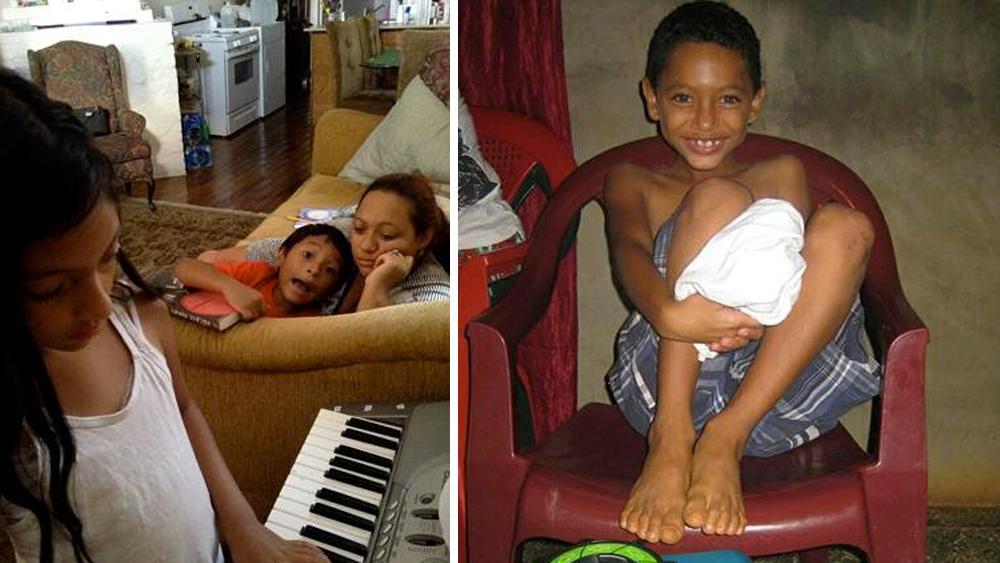(Left photo) Mariela, Jefferson and Ilda Sarmiento in the US and (Right photo) Johan in Honduras.
Ilda Sarmiento has three kids. Her youngest two live with her in New Orleans. They’ve never met their big brother, Johan, who was born in Honduras and still lives there, in the town of Catacamas.
I went to visit Johan recently in Catacamas. The town has sort of a Wild West feel, with dusty roads and a reputation for lawlessness. (My taxi driver was not happy about taking me there.) Johan, who’s 11, lives with his grandmother and aunt's cinderblock house set back from the road, with a sloping front yard just big enough to get a football game going.
Johan’s mom, Ilda, grew up here too. But when she graduated high school she couldn’t find a job. So like many Hondurans, Ilda decided to go to the States, where she could earn more money to send back to her family.
Ilda says you can find work there in small markets, bodegas, but you only make about $50 a month and it’s really hard to survive on that.
She had a friend in New Orleans, where many Central American immigrants found work after Hurricane Katrina. But leaving home meant leaving Johan, too. He was just 2 years old.
“I didn’t have a choice,” she says. She couldn’t afford to take him with her, so at age 19, Ilda left Johan with her mother and made her way to New Orleans.
Now, nine years later, she’s married and has her own business cleaning houses, though she's living in the US without papers.
And she has two more kids, Mariela, 8, and Jefferson, 7, both US citizens. I hung out with them one afternoon over the summer.
Some things about being a kid are the same, no matter where you grow up. You learn some of the same stuff in school. You goof around and sing songs, whether it's the national anthem through a blade of grass or your own version of a Taylor Swift tune.
But beyond the basics, life is pretty different for Johan than it is for his younger siblings. Mariela and Jefferson go to a public charter school in New Orleans, with a solid reputation. Johan’s grandmother sends him to school each day in a taxi because it’s too dangerous for him to walk there. Ilda says just about everybody is subject to gang recruitment in school in Catacamas. Her own brother faced so much harassment that he escaped to the US, where he was granted temporary juvenile protected status on the grounds that he was fleeing dangerous conditions in his neighborhood — the same neighborhood where Johan is growing up.
On top of worrying about gangs, Johan has faced some serious health issues. First, everyone in his family got chikungunya, a mosquito-born illness that makes your bones feel like they’re being crushed. Then Johan got dengue fever, which kept him in bed for a week with a high fever, swollen arms and legs. But he’s recovered now, and his spirits are high as he enters the new school year.
Last year, when President Obama issued his executive order on immigration, Deferred Action for Parents of Americans (DAPA), Ilda had hopes that she could send for Johan soon. Under DAPA, she might have been eligible for temporary legal status. But Obama's executive order remains in limbo, blocked by a court ruling. So for now, Johan remains in Honduras.
Mariela and Jefferson know enough to feel lucky that they live in the States and not Honduras.
“I don’t want to go to Honduras because there’s bad stuff and because there’s fighting in there and people killing people too much,” Jefferson says. “ I would like to go in the future when all that stops.”
But they would love to have their brother join them in New Orleans.
“It would be different because we’d all get to play together,” says Mariela. “Every single day when we wake up.”
“We could talk to him and teach him English,” Jefferson adds.
In the meantime, though, they can still communicate. Before I left for Honduras, I recorded a message from Mariela and Jefferson to take to Johan.
They say in Spanish, "Hi Johan, I’m recording this for you to say that I love you and I want to see you one day and I hope that you learn English, and that you’re doing well in Honduras."
And when I was in Catacamas, he recorded one to send back.
"I miss my brother and sister, I love them very much. I want to go there and meet them. I hope one day I’ll see them."
Our coverage reaches millions each week, but only a small fraction of listeners contribute to sustain our program. We still need 224 more people to donate $100 or $10/monthly to unlock our $67,000 match. Will you help us get there today?
